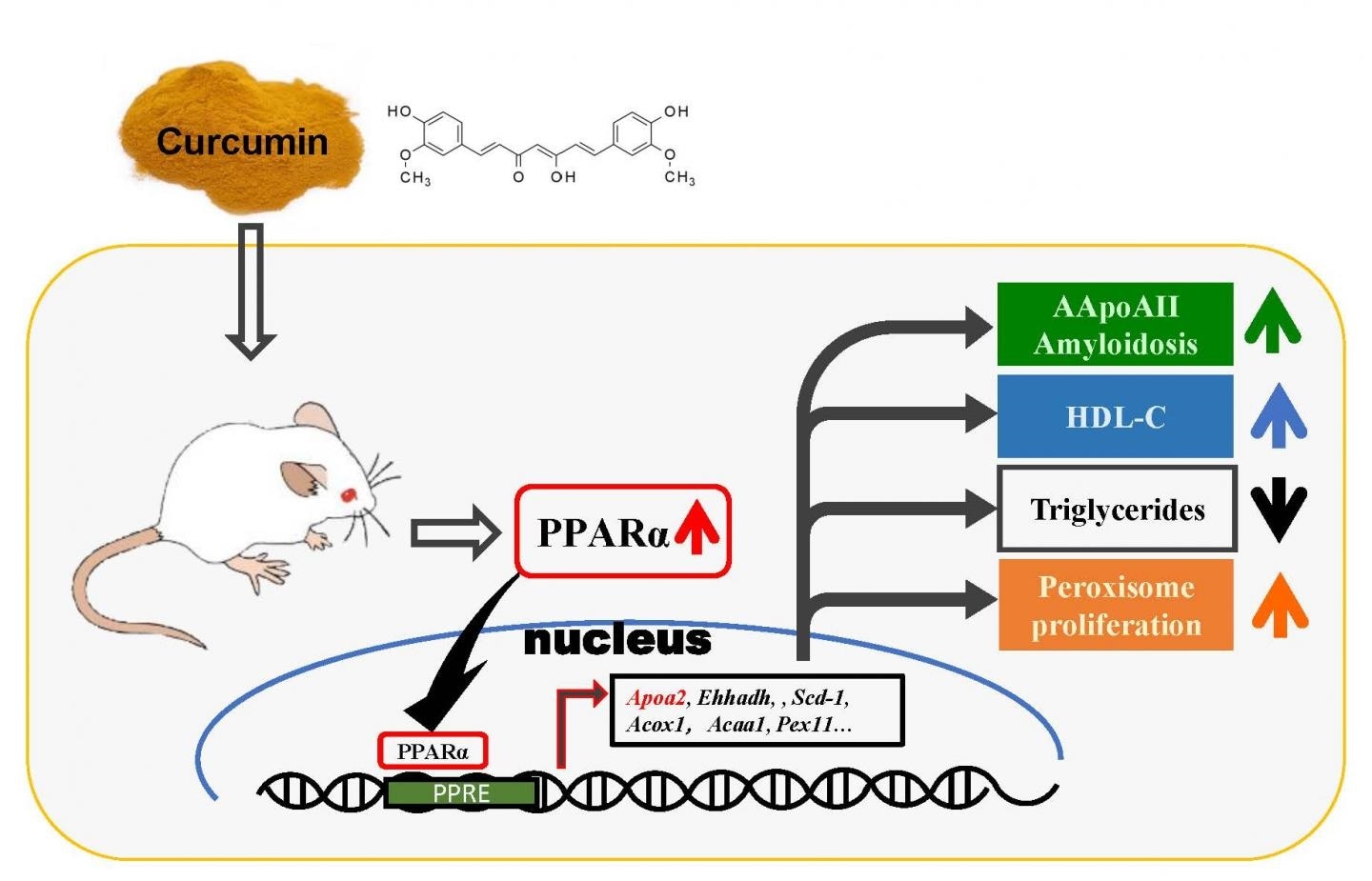Plants of the Curcuma longa species produce a polyphenol compound, called Curcumin. Reportedly, this compound has several physiological activities, which include anti-inflammatory, anti-oxidation, anti-amyloid, and anti-cancer properties. But the network and mechanism of action are not entirely clear.

Schematic diagram of the effect of curcumin mediated by PPARa pathway in AApoAII amyloidosis model mouse. Image Credit: 2021, Jian Dai.
Amyloidosis is essentially a set of diseases characterized by unusual aggregates of proteins, called amyloid fibrils, and following deposition in numerous organs and tissues, like immunoglobulin light chain amyloidosis and Alzheimer’s disease.
In earlier studies, curcumin has been demonstrated to inhibit the cytotoxicity and aggregation of several amyloid proteins in vitro, like amyloid ß (Aß), transthyretin, α-synuclein, and prion protein. This compound has also been shown to block the accumulation of Aß fibrils in a mouse model of Alzheimer’s disease.
The researchers studied the deposition of amyloid and molecular differences in a mouse model of amyloid apolipoprotein A-II (AApoAII) amyloidosis, wherein mice were given a diet supplemented with curcumin.
In this study, it was observed that the consumption of curcumin increased the concentration of ApoA-II and HDL cholesterol in plasma by stimulating the receptor alpha (PPARα) signaling pathway activated by peroxisome proliferator, leading to increased deposition of AApoAII amyloid and proliferation of peroxisome
These discoveries reveal the new agonistic impact of curcumin on PPARα—a significant transcription factor for lipid metabolism—and may have far-reaching importance for treating amyloidosis and other metabolic diseases.
High-fat diet supplement has been reported to exacerbate a range of amyloid deposition, such as Aß in Alzheimer’s disease model mice; however, a relation between the development of amyloidosis and lipid metabolism has not been fully determined.
These outcomes offer a potential molecular target to interpret the molecular mechanism of amyloidogenesis, which the stimulated state of PPARα pathway may serve as a bridge to link the degree of amyloid deposition and the change of lipid metabolism level.
Additionally, it was assumed that curcumin, as an agonist of PPARγ, performs antioxidant, anti-inflammatory, and anti-cancer activities before. But the new study shows that curcumin is a PPARα/γ dual activator and may influence the expression levels of proteins that play a role in amyloid deposition and other similar metabolism roles in a complex way. By targeting the PPARα pathway, the researchers hope to provide a chance to reconsider the mechanism of the physiological impacts of curcumin.
In the following stage, the researchers would prefer to elucidate how curcumin stimulates the PPARα signaling pathway in vitro and establish whether the activation of the PPARα pathway can influence the deposition of amyloid on other forms of amyloidosis in vivo (ATTR amyloidosis, Alzheimer’s disease, etc.).
The objective of this study is to explain the molecular pathways that play a role in the pathogenesis of amyloidosis in vivo and to design effective therapeutic or preventive strategies against the formation of amyloidosis.
As a future research work, the researchers hope to completely interpret the molecular variations of PPARα-activated cells and validate the effectiveness of interventions in such pathways for numerous metabolic diseases.
Source:
Journal reference:
Dai, J., et al. (2021) Curcumin promotes AApoAII amyloidosis and peroxisome proliferation in mice by activating the PPARα signaling pathway. eLife. doi.org/10.7554/eLife.63538.